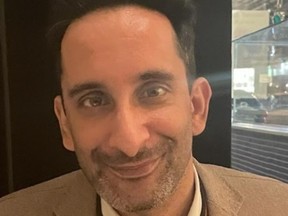Howard Levitt: Lack of scrutiny in appointment of CHRC disturbing

Opinion: Birju Dattani’s appointment to the CHRC will not survive this maelstrom after embarrassing the Liberal government

Article content
Appointments of judges, arbitrators and, for today’s purpose, human rights commissioners, have real-life consequences. After all, the people who decide things matter.
The Canadian Human Rights Commission (CHRC) already had considerable power before Prime Minister Justin Trudeau’s new Online Harms Act, amending the Canadian Human Rights Act, made it the arbiter of complaints about online hate speech. Of course, what constitutes “hate speech” remains open for debate.
Advertisement 2
Article content
As Margaret Atwood put it in a Tweet, “It’s Lettres de Cachet all over again. The possibilities for revenge, false accusations + thought crime stuff are sooo inviting!”
Advertisement 3
Article content
The potential problems are not limited to people making false allegations or deliberately misconstruing an online post to attack or avenge an opponent. There is also significant potential for mischief at the commission itself, particularly when it comes to who is making the decisions. And Canadians now have a new reason to worry about that.
Some years ago, I made a rather disparaging comment about a tribunal decisionmaker. That comment was, “On first reading (of the decision), I thought he must be daft. But on rereading it, I realized that he was indeed daft.” That triggered a call from the Law Society with a friendly reminder that, as a lawyer, I am not permitted to publicly opine with views that place judicial officers into disrepute.
I hope I am not offending that rule in today’s column, since my criticism is more about the government making the appointment than it is about the appointee himself.
On June 14, Justice Minister Arif Virani announced Birju Dattani as head of the CHRC. One would think that such a prestigious appointment would have come with serious background checks involving social media and other public forums.
Article content
Advertisement 4
Article content
Apparently not, according to Minister Virani, who claims no knowledge of Dattani’s controversial past, including such instances as Dattani sharing a platform in England with a member of a banned Islamist fundamentalist organization opposed to the existence of the state of Israel. Or Dattani posting links on social media to articles comparing Israelis to Nazis and Palestinians to Jews incarcerated in the Warsaw Ghetto. Or the many times he lectured at Israeli apartheid week in the U.K. The CBC has also reported on a since-deleted article Dattani posted on X, which “compared Israel to Nazi Germany.”
One Might also expect specific vetting around anti-semitism upon seeing that Dattani’s first job after graduation was with the Syrian Legal Development Program.
After the announcement, Pierre Poilievre tweeted, “Trudeau Liberals appoint an antisemite who compared Israelis to Nazis as head of the Canadian Human Rights Commission. Liberal MP Housefather…. the NDP & Bloc could agree to recall committee to investigate this grotesque appointment but they won’t.”
Advertisement 5
Article content
Advertisement 6
Article content
Dattani now denies having held these views and, as our prime minister is wont to do, apologized to the Jewish community. But fundamental to justice is the belief in both the competence and even-handedness of those making decisions affecting the parties before them.
To use a sexist phrase from a judge in an old legal case, “In conflict of interest cases, the rule of Ceasar’s wife applies. It must not only be pure. It must be seen to be pure.” Short of actual conflict of interest, the appearance of conflict is sufficient. Simply, litigants must have reason to believe in the impartiality of their courts and human rights commissions.
Quite apart from these more serious concerns, I would have questioned Dattani’s appointment based on credentials alone.
Dattani obtained his law degree in 2008 and has occupied only middling administrative positions since, his most recent being as director of human rights and conflict resolution at Centennial College — a solid job, but many steps below chair of our national Human Rights Commission.
The Commission was already in crisis prior to Dattani’s appointment, after the Secretariat of the Treasury Board of Canada found it had discriminated against its own black employees. Rather ironic. As result, it is now under special review by the Global Alliance of National Human Rights Institutions and at risk of being downgraded.
Advertisement 7
Article content
In light of the CHRC’s already precarious position and its importance to Canadians, one would expect Minister Virani to have paid special attention to this appointment. But, as Collin May, former chief of the Alberta Human Rights Commission recently wrote in these pages, “Human rights have increasingly become the domain of politicized battles waged by virtue-signalling politicians and illiberal activists.” Jordan Peterson would no doubt agree.
While Minister Virani now appears to be backtracking, the beleaguered Commission is doubling down, stating that it looks forward to Dattani joining as its head. That itself raises interesting concerns.
The questions are obvious and many. Can any Jew feel comfortable making a complaint of antisemitism to a Commission run by Dattani or continuing to support his appointment? And if there is a complaint of Islamaphobia, would the accused have the perception that a Dattani-led CHRC would deal with it objectively and fairly? What are the legal issues?
If an employee misrepresents themselves on a resume or in interviews, it is cause for discharge once discovered. Was Dattani asked any questions about his past involvements or social media history, as anyone appointed chair of the CHRC should have been? After all, candidates for virtually any senior position nowadays should, at a minimum, be asked whether there is anything in their past that could potentially embarrass the employer. How could Virani not have asked such a fundamental question? What is an interview for if not to ask about a person’s past?
Advertisement 8
Article content
Recommended from Editorial
Even if Dattani wasn’t asked such standard questions, his failure to disclose his troubling past conduct could still be cause for discharge, as nondisclosure of material information by an executive in a job interview often is. For example, in one case a lawyer hired into CP’s law department was successfully fired for cause when the company learned he had failed to disclose that, at the time of his hiring, he was under RCMP investigation for influence peddling.
I suspect Dattani will not survive this maelstrom, as his appointment committed the unpardonable sin of embarrassing the Liberal government. The bigger question is whether the Commission will, with this latest scandal, survive its continued public support for his appointment.
Howard Levitt is senior partner of Levitt LLP, employment and labour lawyers with offices in Ontario, Alberta and B.C.. He practices employment law in eight provinces and is the author of six books, including the Law of Dismissal in Canada.
Article content




